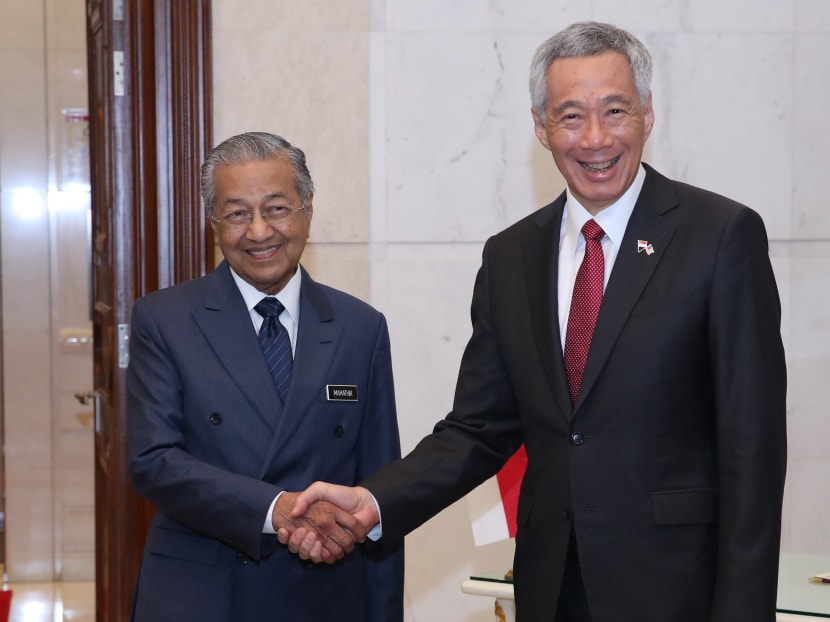‘Achievement’ that Singapore and Malaysia have not suggested going to war over differences, says Mahathir
PUTRAJAYA — It is a "not a minor achievement" that Singapore and Malaysia have not confronted each other or suggested that bilateral issues be resolved through violent means such as war, Malaysian Prime Minister Mahathir Mohamad said on Tuesday (April 9).

Singapore Prime Minister Lee Hsien Loong and Malaysia Prime Minister Dr Mahathir Mohamad at an annual leaders’ retreat in April, 2019.
PUTRAJAYA — It is "not a minor achievement" that Singapore and Malaysia have not confronted each other or suggested that bilateral issues be resolved through violent means such as war, Malaysian Prime Minister Mahathir Mohamad said on Tuesday (April 9).
“We’ve aired our problems sometimes publicly, sometimes privately. What we have not done, is that we’ve not confronted each other or even suggested that we should resolve our problems through violent action like going to war with Singapore. This is not a minor achievement,” Dr Mahathir said at a press conference in his office in Putrajaya near Kuala Lumpur.
Earlier, he met Singapore Prime Minister Lee Hsien Loong at an annual leaders’ retreat, where they discussed unresolved bilateral issues on water, airspace and maritime boundaries.
“If you look throughout the world, most countries that quarrel with their neighbours try to solve their problems through violence and through wars, and in the end, both sides will lose,” added Dr Mahathir.
He noted that ties on both sides of the Causeway have always been “good” and “at least, we’re always on talking terms”.
Dr Mahathir was responding to a question on how he saw bilateral ties developing for the remainder of his government’s term.
Mr Lee said that as neighbours, Singapore and Malaysia have worked very hard to develop and manage their relationship.
While they have become very different, especially after Singapore gained independence in 1965, Mr Lee said that the two sides have much in common when it comes to heritage, connections and the rule of law.
“We even argue who invented some of our foods first,” he added.
“There is tremendous potential for us to move ahead in a co-operative and mutually beneficial way, provided we work at the relationship.”
Disputes over airspace and maritime boundaries can be “productive” if managed well, and the bilateral relationship can “prosper”, he said.
But if they are not handled well, they could “cause a lot of trouble and poison the overall relationship”, he said.
Singapore and Malaysia have formed a high-level committee to review the present airspace arrangement, after Malaysia expressed its wish to take over the provision of air-traffic services over southern peninsular Malaysia, which Singapore oversees. The International Civil Aviation Organisation (ICAO) had brokered this arrangement at a 1973 regional air-navigation meeting.
The two countries, meanwhile, will also begin talks on delimiting their maritime boundaries within a month, after both sides mutually suspended their overlapping port limits on Monday.
PROBLEMS ‘BY NO MEANS OVER’
Speaking to the Singapore media on Tuesday afternoon, Mr Lee said that the problems are “by no means completely over” because delimiting maritime boundaries will take some time.
The issue of air-traffic service provision over southern peninsular Malaysia is also “a complicated matter”, because it not only involves ICAO but also airlines.
“It involves a vast amount of civil aviation; there are safety issues, too,” said Mr Lee.
Reiterating Transport Minister Khaw Boon Wan’s comments on Monday, Mr Lee said there are opportunities for the two sides to co-operate, because the expansion of civil aviation and passenger traffic has benefited the Asia-Pacific and South-east Asia.
People have had the opportunity to travel, do business and prosper, and traffic has increased at airports such as Kuala Lumpur International Airport and Changi Airport.
“You need to work together in order to realise that, and unless we can provide a system which is safe, efficient, and which will meet the needs of the commercial operators, I think all sides will be losers,” Mr Lee said.
Asked what the Singapore government has learnt from its interactions with the Pakatan Harapan government — which came into power after Malaysia’s election in May last year — Mr Lee said Dr Mahathir is an “old hand” with a long understanding and memory of the bilateral relationship.
But many Malaysian government ministers are new and Singapore’s leaders have been developing ties with them, Mr Lee said. Singapore’s Attorney-General Lucien Wong has been doing likewise with his Malaysian counterpart Tommy Thomas.
“So it’s a process of getting to know one another, picking up the threads and taking the relationship forward, which continues whoever is in charge on either side,” said Mr Lee.
“I think it’s a learning journey, but it’s also an opportunity to develop relations to go on to the next generation.”











